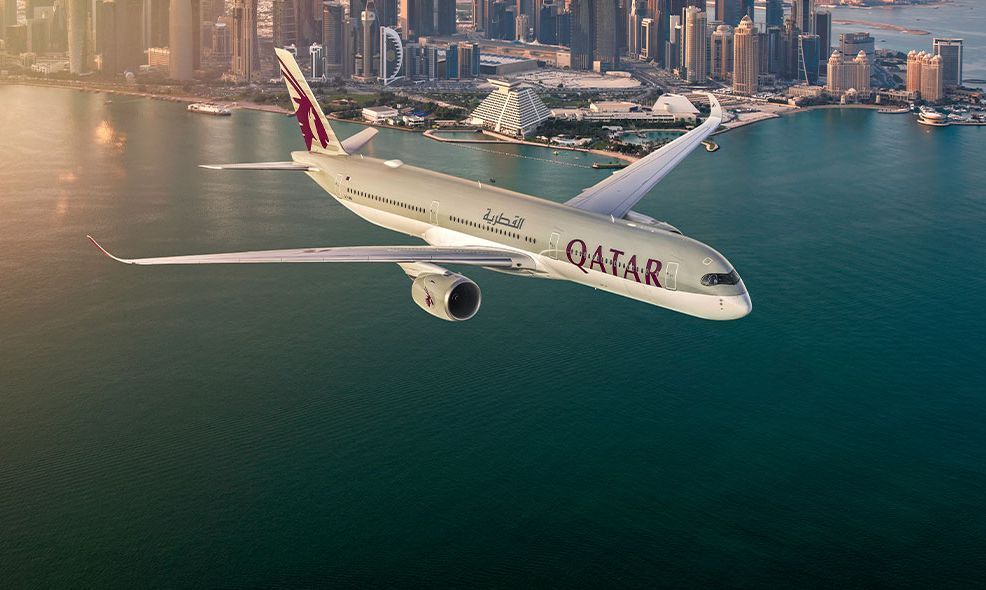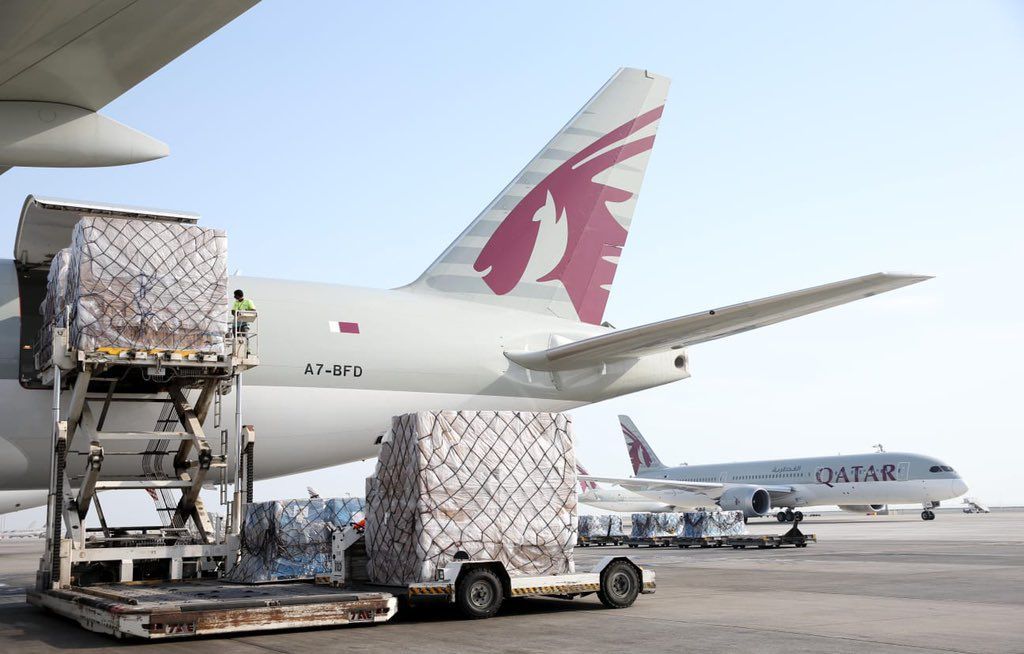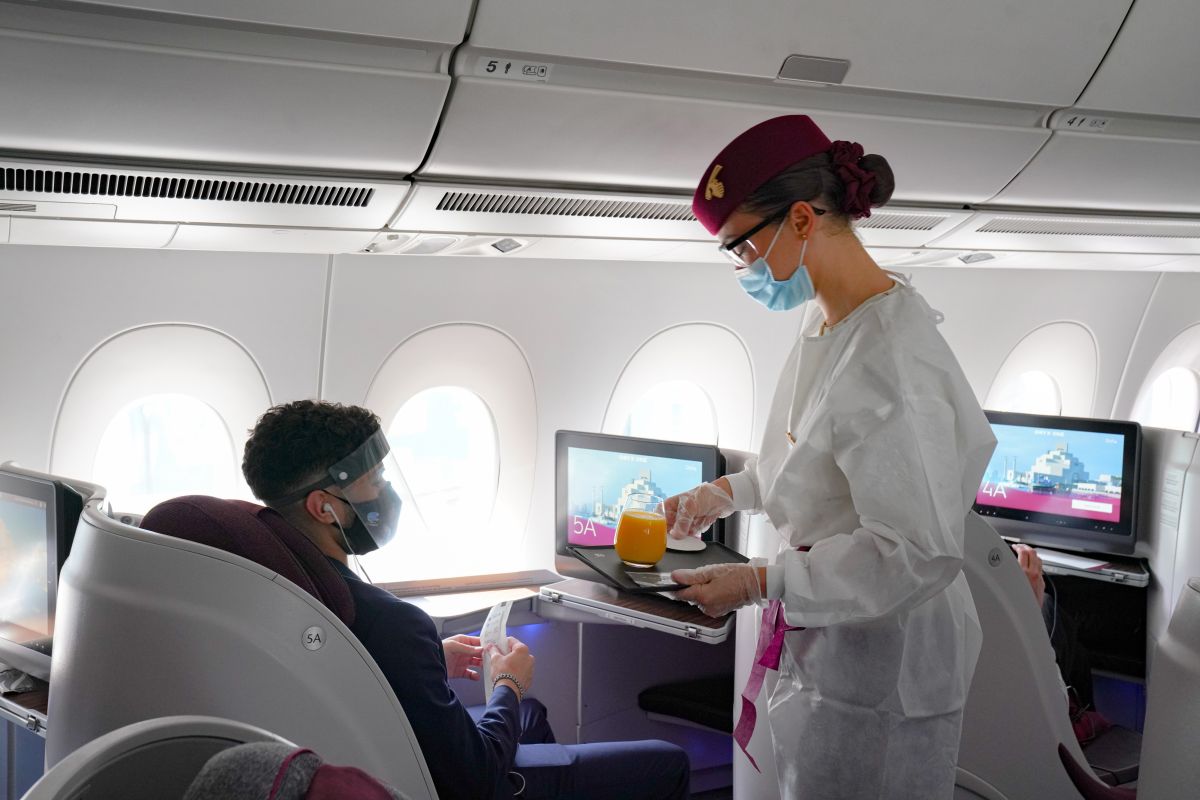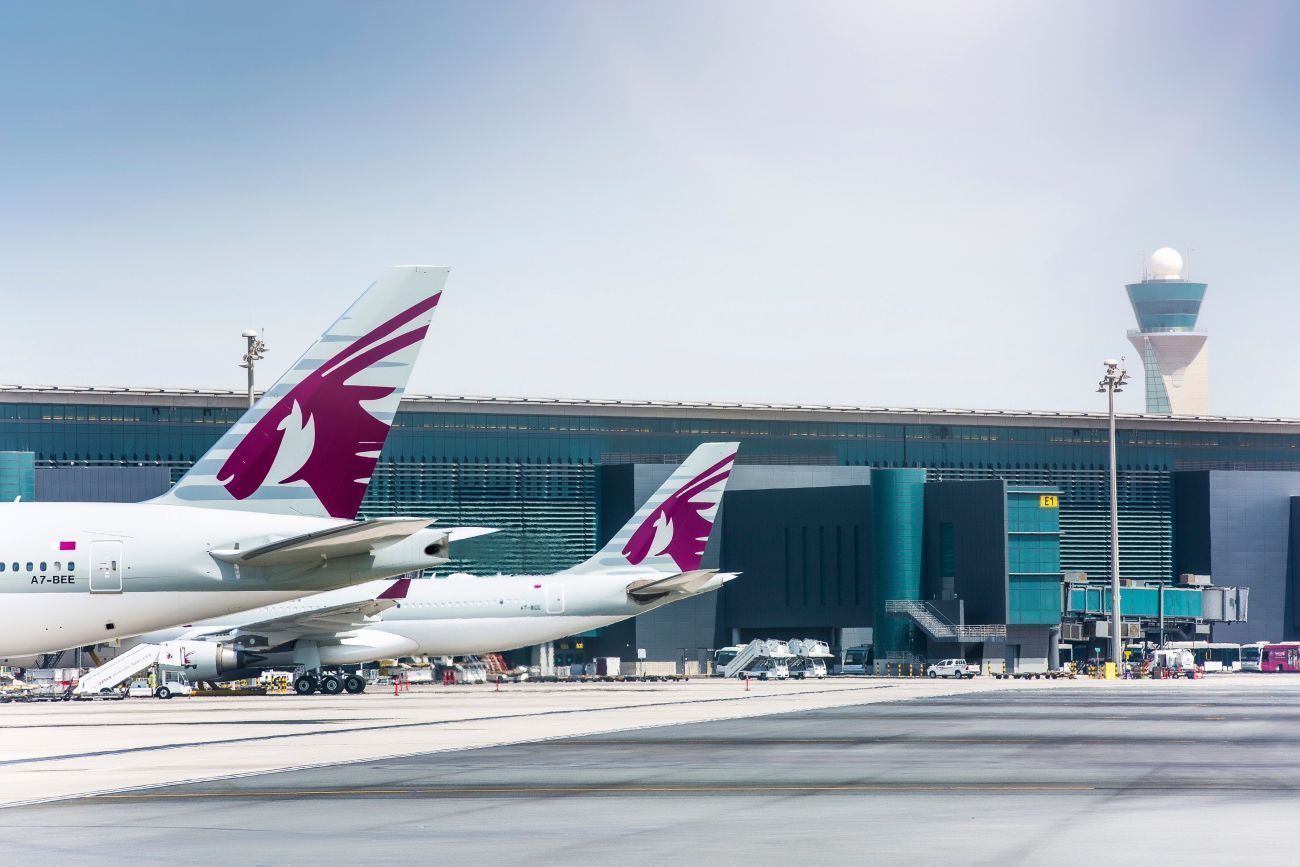Interview – Mate Hoffmann: ‘Greece Continues to be One of Qatar Airways’ Most Prominent Markets’
“Greece has always been and continues to be one of our most prominent markets,” says Qatar Airways Regional Manager for Southern Europe, Mate Hoffmann.
Leading the sales teams across several countries including Greece, since February, Mate spoke to GTP Headlines during the days of the restart of Greek tourism.
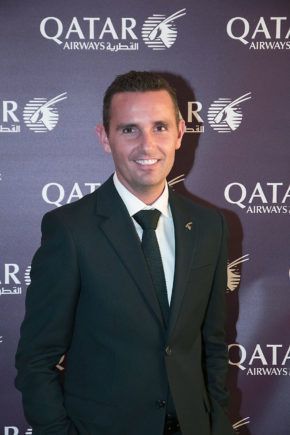 “We are delighted to join the Greek tourist industry start up efforts,” he said.
“We are delighted to join the Greek tourist industry start up efforts,” he said.
Greece opened for tourism on May 14 and on the same day Qatar Airways resumed its service from Doha to Mykonos for the summer season.
“We know there is a great global appetite to return to the wonderful country and its beautiful islands,” he told GTP Headlines.
In this interview, Mate tells us how Qatar Airways is committed to further develop tourism and trade connections with Greece and gives information on a number of issues on the airline’s agenda including environmental sustainability.
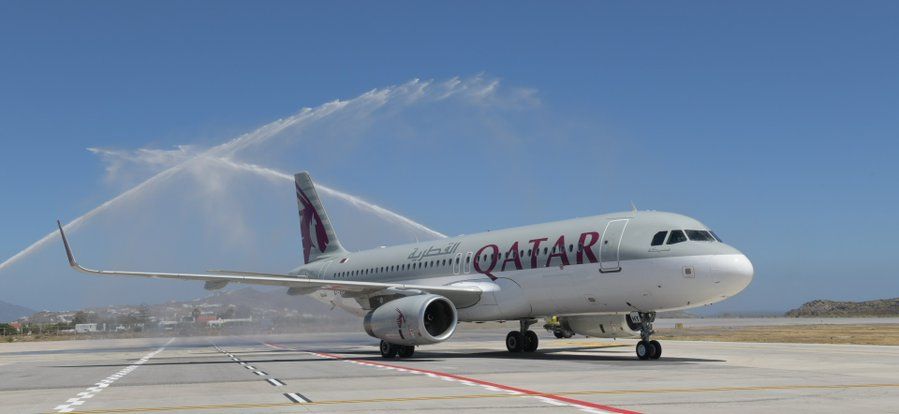
Qatar Airways on May 14 resumed regular flights between Doha and Mykonos, marking the beginning of a new travel bubble between Qatar and Greece meaning fully-vaccinated holidaymakers will no longer need to quarantine on arrival. Photo source: Qatar Airways
- GTP: Mate, please share some career highlights with our readers.
Mate Hoffmann: I took my first step in aviation as a cabin crew member at the national carrier of Hungary before moving to the commercial area of the business. This gave me the opportunity to see the entire ‘journey’: from selling a ticket to a customer and then the customer flying as a passenger to a destination. A fun fact is that part of my job back then was selling charter flights to Greek islands.
I joined Qatar Airways in Doha 11 years ago. I must say that it was a fantastic experience working and living in Doha, London and Rome; getting to know the airline inside-out in Head Office, Regional Office and at station; to be part of the decision making process of dozens of new routes and countries. I took my current position as the airline’s regional manager for Southern Europe in mid-February.
- GTP: We are having this interview in the Covid-19 era and aviation has been one of the worst affected of all major economic sectors. Just how challenging is taking over this position in these times?
Mate Hoffmann: Of course it is challenging but Qatar Airways is in a strong position. We took the decision at the start to keep flying and we got hundreds of thousands of people home. That gave a lot of people a chance to try our product for the first time and they liked what they experienced.
- GTP: Yes it is a known fact that – since the start of the pandemic in 2020 – Qatar Airways never stopped flying but transported cargo and continued to maintain scheduled passenger flights (where possible). What was the reason for this? Were there thoughts of suspending operations?
Mate Hoffmann: We felt it was the right thing to do to keep going and to offer our customers and our trade partners a sense of reliability. We made sure when we published a flying schedule that we could complete it and we only cancelled flights because it was mandated due to regulatory restrictions or where there has really been no demand.
- GTP: Do we have a figure of how many people Qatar Airways flew home on repatriation flights and how many cargo flights (transporting medical equipment) have been operated throughout the pandemic?
Mate Hoffmann: I cannot give an exact figure on repatriation flights but it was hundreds of thousands. In terms of cargo in the past few months, the airline has transported over 250,000 tonnes of medical and aid supplies to impacted regions around the globe. This equates to roughly 2,500 fully loaded Boeing 777F. We have had up to 180 dedicated cargo flights per day and more than 100 tonnes of medical supplies have also been shipped free of charge to countries including Iran, Rwanda, Lebanon, Tunisia, Algeria, and Nepal. Qatar Airways Cargo has prioritised aid and medical supply shipments while also offering a discount on market rates to transport these essential supplies on our flights.
- GTP: I’d like to move on to Greece. What are your strategies for Greece in the post-Covid-19 era? I know that the Athens-Doha route never stopped during the pandemic. Also, the day Greek tourism reopened, Qatar Airways restarted flights between Doha and Mykonos. This shows that the airline has confidence in the Greek market. What does Qatar Airways see in the future for Greece?
Mate Hoffmann: We work closely with all the stakeholders in the Greek tourism sector. After all, it is a common goal and we are delighted to join the Greek tourist industry start up efforts. We know there is a great global appetite to return to the wonderful country and its beautiful islands.
Greece has always been and continues to be one of our most prominent markets and we have seen a significant demand for tourists trying to reach Greece for upcoming summer.
We realize it is crucial to attract tourism from our global network to Greece, not only during summer season but all year-round and we are committed to further develop tourism and trade connections with a focus to carry travelers through our expanding network of new and existing destinations.
- GTP: Should we expect the restart of the route connecting Doha to Thessaloniki as well?
Mate Hoffmann: We are constantly evaluating our route network and we will re-open those routes we have suspended where we can as soon as it is practical and demand returns.
- GTP: What are Qatar Airways’ plans with regard to environmental sustainability?
Mate Hoffmann: In the last few months of 2020, Qatar Airways took delivery of three Airbus A350-1000s, reaffirming its position as one of the largest operator of Airbus A350 aircraft with an average age of 2.6 years.
The airline’s fleet of 53 Airbus A350 and 30 Boeing 787 are the ideal choice for the most strategically important long-haul routes to Africa, the Americas, Europe and Asia-Pacific regions.
The airline grounded its fleet of Airbus A380s as it is not environmentally justifiable to operate such a large, four-engine aircraft in the current market. Of 10, we have taken five out permanently now and we will have to think hard before we recommission the other five. It is not the right aircraft for the recovery at the moment. Until passenger demand recovers to appropriate levels, Qatar Airways will continue to keep its A380 aircraft grounded, ensuring it only operates commercially and environmentally responsible aircraft.
Qatar Airways also launched a new programme that enables passengers to voluntarily offset the carbon emissions associated with their journey at the point of booking their ticket. The airline along with its oneworld alliance members also committed to net zero carbon emissions by 2050, becoming the first global airline alliance to unite behind a common target to achieve carbon neutrality.
As part of Qatar Airways Cargo’s sustainability programme – Chapter 2 of WeQare: Rewild the Planet, the cargo carrier is committed to preserving wildlife and endangered animals and has pledged to transport these animals back to their natural habitat, free of charge.
- GTP: Qatar Airways has become the first global airline in the world to be certified for Covid-19 safety by Skytrax. And Doha’s Hamad International Airport was the first airport to be certified for the same reason. What did Qatar Airways and HIA do differently than other airlines and airports to gain this recognition?
Mate Hoffmann: I cannot comment on other airlines or airports – but we made sure that we were at the forefront of the hygiene effort and we continue to focus on that. We are working with all the authorities to ensure we comply with rules as they change or adapted. We maintain stringent hygiene and most recently we have become the first global carrier to operate Honeywell’s Ultraviolet (UV) Cabin System version 2.0, further advancing hygiene measures on board.
- GTP: Are there plans for expansion at HIA?
Mate Hoffmann: Hamad International Airport will go ahead with its expansions plans and will achieve a capacity to handle more than 55 million passengers ahead of the FIFA World Cup 2022.
We are expanding a huge area of the western runway. We are also building the north node of the Hamad International Airport, which will increase the capacity to over 55 million passengers.
The expansion plans, which have been in place since the fourth quarter of 2019, will be carried out in two phases. The first phase will include linking the North Node to the new Central Concourse. This phase of the airport’s expansion is set to increase the terminal’s annual handling capacity to over 55 million passengers by 2022, when Qatar hosts the FIFA World Cup.
Immediately after the world cup HIA would undergo the final expansion which will take the airport’s capacity to more than 65 million passengers annually.
Much work has been done by the hospitality industry in Qatar to ensure that visitors can enjoy a safe visit when its borders open and I believe that travellers will be eager to see what we have to offer, especially as interest in Qatar will grow in the run up to the 2022 FIFA World Cup Qatar.
- GTP: Qatar Airways is currently operating to 130 destinations and almost 1,000 flights every week. Looking ahead, as markets return and governments adjust their travel restrictions, will more capacity be added?
Mate Hoffmann: Yes – we will add capacity when it is safe to do so and we are looking forward to helping the world recover and get travelling again.
- GTP: What message would you like to pass on to our readers?
Mate Hoffmann: We believe that travel will steadily return, limited by entry restrictions rather than customer confidence. People will want to travel again, experience the world, and meet friends and family as well as business travel restarting.
In many ways, the restrictions have made people realise how precious the ability to travel really is and perhaps was taken for granted. We anticipate supply will closely match demand as airlines have available aircraft to meet this measured return of passengers. We believe fares will remain competitive as demand returns and people return to the skies.
Several of the measures we have implemented are temporary but the industry will likely see some long-term changes. It is far too early to anticipate what changes will become more permanent as these will be driven by the availability of vaccinations, consumer behaviour, airport and health protocols.
Governments need to work with international bodies such as IATA and ICAO to establish and formalise regulatory guidelines so airlines can operate with certainty and focus on the business of flying rather than navigating red tape.
For Qatar Airways, safety of our employees and passengers will remain a priority. As you have seen in the past one year, Qatar Airways lead the way by ensuring smooth, safe and least impact on our passengers traveling during these stressful times. Our constant investments related to Aircraft disinfections, PPE and Hamad International Airport has been quite significant, all these efforts and investments are directed towards restarting safe travel and we hope that customers will chose Qatar Airways as an Airline they can rely on.

